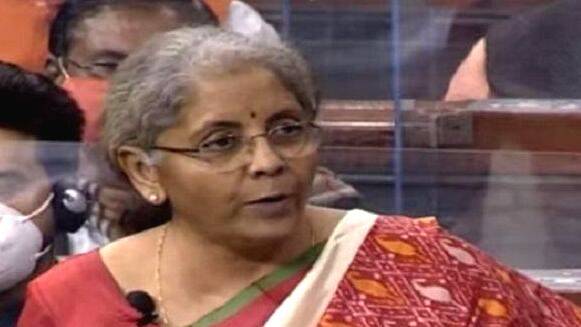

NEW DELHI: Finance Minister Nirmala Sitharaman has begun presenting the Union Budget 2021-22 in Parliament. Addressing the government’s health care spending, Sitharaman announced a total spend of around Rs 2 lakh crore on healthcare with Rs 35,000 crore on Covid-19 vaccine development and innoculation. Scroll down for real-time alerts and analysis as Sitharaman speaks.
Sitharaman, in her speech till now has announced a push to the textile industry, a central university in Leh, a focus on sea-weed farming with a new facility in Tamil Nadu and a new vehicle scrapping policy that aims to provide the auto sector a boost among other announcements. Sitharaman also announced that an additional 1 crore families will now benefit under the Centre’s Ujjwala scheme. Four poll-bound states will see significant spending on its highways.
After an estimated 7.7 per cent contraction in 2020-21, the Finance Ministry’s Economic Survey projects that India’s real GDP would record a growth of 11 per cent in 2021-22. The nominal GDP growth has been estimated at 15.4 per cent, implying an assumption of 4.4 per cent inflation during the year.
Sitharaman has raised hopes by stating that Budget 2021-22 will “be a Budget like never before.” Expectations are high that the government will boost economic revival by focusing on infrastructure, healthcare, agriculture, rural economy, MSMEs sectors impacted by the Covid-19 pandemic and lockdown restrictions.
This would be Sitharaman’s third budget under the National Democratic Alliance (NDA) government led by Prime Minister Narendra Modi. In a significant departure from the tradition, this year’s Budget will be unique as it will be paperless.
Other highlights are as follows:
The '1 Nation 1 Ration Card' plan is under implementation by 32 States & UTs. The Centre will launch a portal to collect data on migrant workers. Further, social security benefits will be extended to platform and gig workers. Minimum wages will apply to all categories of workers.
Social security benefits to be extended to gig and platform workers. Employee State Insurance Corporation benefits too would be provided. Women will be allowed to work in all categories in night shifts too.
Rationalising different security market regulations under one market code is a significant step in ease of doing business and would go a long way in attracting foreign investments in India.
Amount paid to wheat farmers in FY20 is Rs 62,802 crore v/s Rs 33,874 crore in FY14. The government is offering MSP of at least 1.5 times of production for all commodities.
“We paid wheat farmers rs 75,100 crore wheat MSP in FY21; paid pulse farmers Rs 10,530 crore in FY21, v/s Rs 8,285 crore in FY20 and Rs 236 crore in FY14; while Cotton farmers received Rs 25,974 crore in FY20, compared to Rs 90 crore in FY14.”
The FY22 Agri-Credit target is at Rs 16.5 lakh crore. Further, the Rural Infra Fund has been increased to Rs 40,000 crore and the Micro Irrigation Fund has been increased to Rs 10,000 crore. The Agri Infra Fund will be available to APMCs.
The government will also set up a seaweed park in Tamil Nadu and will develop 5 major fishing hubs.
Five major fishing hubs to be developed to promote the fisheries sector. Additionally, a seaweed park is also being planned in Tamil Nadu. Stocks to benefit: Avanti Feeds, Waterbase and Apex Frozen foods.
It is now expected that close to 8,500 km of new projects will be awarded before the end of the current fiscal. It’s a big boost for road construction companies because last year the pace of awarding it was lower due to the pandemic.
While the 74 percent FDI insurance limit hike has been proposed in Budget 2021, the real test will be when the amendment bill is introduced in Parliament. There is a difference of opinion among senior party leaders on allowing foreign investors in insurance companies to have majority control.
An independent gas transport system will be set up and 100 more districts will be added under the City Gas Expansion.
The government is also looking to double ship recycling capacity by 2024. Seven port projects worth more than Rs 20,000 crore will be undertaken in FY22 via PPP. A scheme to assit discoms will be launched with an outlay of over Rs 3 lakh crore. The Ujjwala Scheme will cover an additional 1 crore beneficiaries.
The 4x increase in the paid-up capital threshold of small companies to Rs 2 crore, and turnover by 10x to Rs 20 crore will ease their compliance and procedural burden. The sharp increase in budgetary allocation for roads, highways and railways will have a multiplier effect on economic growth over the medium term.
A bad bank is finally here! FM has announced setting up of an institution to address the stressed assets in the banking system through an ARC model. And that’s much-awaited good news for the banking sector because the banking sector is on the verge of a second wave of bad loan spike. A bad bank could help shift the toxic assets to a separate entity so that banks can focus on fresh business.
PM Aatmanirbhar Swasth Bharat Yojana to develop capacities of health care systems, develop institutions for detection and cure of new and emerging disease is the first step to boost rural health and keep country ready for emergency handling of pandemic situations. Further, increasing access to pneumococcal vaccine to all states and budget outlay for health and welfare by 137% as compared to the previous year will boost the public health and pharmaceuticals sector.